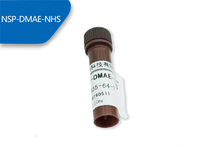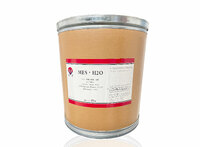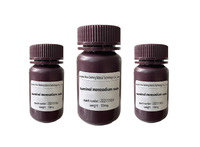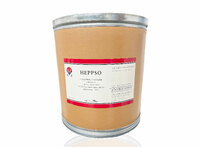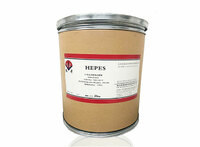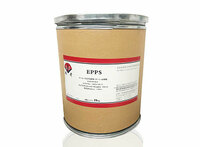NSP-DMAE-NHS CAS NO.194357-64-7
Product Quick Detail
- FOB Price
- USD $50.00 / Piece
- Place Of Origin
- Ezhou City, Hubei Province, China
- Packaging
- 10mg, 10g, 50g, 500g, 1L, 20L, 20kg/box, 25kg/barrel
- Delivery
- 3-30 Days
Specifications
The CAS number of nsp dmae nhs is: 194357-64-7, and the molecular formula is C30H26N2O9S. It is a luminescent substrate reagent used in chemiluminescence experiments. Its parent is acridine ester.
Many derivatives with different properties, acridinium ester NSP-DMAE-NHS is one of the more commonly used ones.
Acridine ester NSP-DMAE-NHS is an acridine derivative newly developed on the basis of traditional acridinium ester AE. It has high luminescence efficiency, good stability, can label various
proteins or antibodies, and has high detection sensitivity. Less background noise.
Details of NSP-DMAE-NHS
Acridine esters are a class of direct chemiluminescent substances that do not require enzymatic catalysis reactions. In a specific solution, acridine ester molecules are attacked by hydrogen
peroxide ions and a series of reactions occur. NSP-DMAE-NHS contains NHS active esters. , the label is directly coupled to it, and the acridinium ester NSP-DMAE-NHS has been widely proven to be an
effective and easy-to-use chemiluminescent label.
NSP-DMAE-NHS Product Advantages
The NSP-DMAE-NHS luminescence system is simple and does not require catalysts, which can reduce background luminescence, improve sensitivity and reduce interference.
The NSP-DMAE-NHS luminescence system has high luminescence efficiency and high intensity, which has unique advantages over other technologies in the field of chemiluminescence immunoassay, usually
five times or more than that of luminol.
The NSP-DMAE-NHS luminescence system has few interference factors, low background and high signal-to-noise ratio.
The molecular weight of NSP-DMAE-NHS is small, and it is easy to connect firmly with proteins through chemical bonds.
Desheng NSP-DMAE-NHS is a golden-yellow powder under normal conditions, with a very fine and bulky texture, a purity greater than 98% by HPLC method, no peculiar smell, and good market feedback
Desheng has a professional R&D team, which can also produce quickly in a short time, and can ensure timely supply to customers.
Desheng is the direct manufacturer of acridine esters, which saves the middle price difference, has favorable prices and timely supply.
Professional foreign trade team, rich export experience, fast delivery
Applications of NSP-DMAE-NHS
Acridine ester has a wide range of applications. NSP-DMAE-NHS is characterized by increased steric hindrance, enhanced hydrolysis resistance, and relatively stable luminescence activity in a
neutral environment. According to its characteristics, the corresponding Projects, such as chemical food safety, biomedicine, environmental testing and other fields.
The acridine ester NSP-DMAE-NHS contains N-hydroxysuccinimide, that is, NHS ester. It is better to complete the labeling without a condensing agent. Under alkaline conditions, the NHS is removed by
the antibody after labeling, and the protein forms a stable amide bond with the acridine ester. After the bulk reaction was completed, the excess acridinium salt was removed through a desalting
column. It does not require catalysis and can self-luminesce in an alkaline medium under oxidative conditions by sodium hydroxide. The addition of the excitation solution causes the reaction system
to immediately release photons at about 430 nm, and the protein concentration can be detected by counting the number of photons using a standard luminometer.
NSP-DMAE-NHS Instructions for Use
First, protect the labeled substance, then carry out acridine ester labeling, and finally HPLC purification and separation of the labeled substance. In this process, it needs to be dissolved in an
absolute anhydrous organic solvent and prepared according to a certain proportion, although the luminescence process of NSP-DMAE-NHS is very short. , it is recommended to use the photon detector
inside the photometer to check the marking results to further improve the detection sensitivity.
NSP-DMAE-NHS Notes
Before use, it is necessary to take out the acridine ester for weighing, and make certain adjustments according to the state of the acridine ester in the bottle, because under the normal state, the
acridine ester needs to be frozen and stored, which leads to the opening of the lid and weighing due to The temperature difference causes water vapor to condense, making the powder partially sticky
and inconvenient to weigh.
Chemiluminescence reagents are not only of the luminol series, but acridine esters are also sensitive to light, so it must be protected from light during storage, and an opaque bottle should be
selected for storage. Hot weather or long-distance transportation requires extra attention and adjustments.
When in use, you can directly peel and weigh the container that dissolves the acridine ester, and then add an anhydrous organic solvent to dissolve it to avoid loss during weighing and transfer (in
the past, some customers thought that the quantity of acridine ester they received was not enough).
- Country: China (Mainland)
- Founded Year: 2017
- Address: C8-2, Optics Valley United Technology City, Gedian Development Zone, Ezhou City, Hubei Province, China
- Contact: Vicky Zhao

